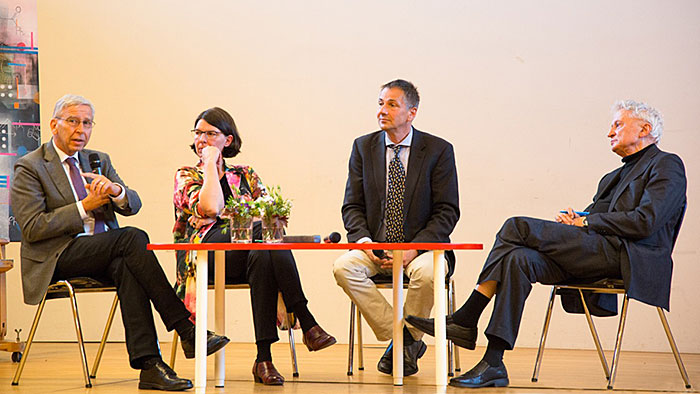An exchange across disciplinary boundaries
“It’s a wonderful opportunity to think about science and the future in a different way than we normally do,” said Professor Thisbe K. Lindhorst, Acting President of the German Chemical Society, at the start of his speech to the 10th Forum of the Elite Network of Bavaria. The annual Forum events, which feature a series of top-class speakers, facilitate an exchange of views on a range of topics that span disciplinary boundaries.
On 26 April 2018, the University of Regensburg's Elite Graduate Program in “Synthesis and Catalysis” invited guests to an event entitled “Future values?! – A change in perspectives”. Taking an interdisciplinary approach and working at the interface of the natural sciences and the humanities, participants discussed the role of values and challenges facing society.
Listening to Goethe, exploring his values
Taking Goethe’s magnum opus ‘Faust’ as a starting point for his speech, Dr. Manfred Osten explored the currency and providence of Goethe’s writing. “Goethe was anything but a cultural pessimist,” he argued. “He was, however, the person to first ask the question: How will basic research impact on people when combined with technology?” said Osten, former Secretary-General of the Alexander von Humboldt Foundation and former Embassy Counsellor (first class).
Osten contended that Goethe saw the need to promote progress, and that he welcomed progress and all the benefits it offered people. “On the other hand,” Osten said, “he took into account the anthropological consequences of such progress. He reflected on this issue guided by values that looked far into the future.” Osten closed his speech with a “plea for a global ethics system based on moderation”.
Considering the consequences of our actions
Professor Dr Thisbe K. Lindhorst then spoke about “a value-led approach to Chemistry”. In light of the problems and challenges facing the world, she discussed the contribution that chemists must make and explained the necessity of applying a “basis of values” to supplement technical knowledge. “We need an ethical basis which we must apply to measure our professional decisions,” she said. “The task is to reflect on what might lie behind things; to consider the consequences of our actions.”
In the subsequent podium discussion, moderated by Professor Burkhard König, Head of the Elite Graduate Program in Synthesis and Catalysis, the speakers and the President of the University of Regensburg, Professor Udo Hebel, exchanged views on “future values” with active participation from the audience. During this discussion, Thisbe Lindhorst issued a call for greater diversity. “I think that our academic culture would benefit greatly from more diversity in our community,” she said. “We would generate even more ideas and adopt an even more diverse approach to nature. And, perhaps, we might discover entirely different values which suit research very well, and come to accept them as self-evident.”


